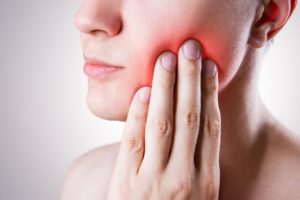Temporomandibular joint disorder (TMJ) is a condition that affects the jaw joint. Your jaw joints (and the surrounding muscles) are responsible for hinging your mouth open and close. This joint disorder can inhibit your ability to use your mouth without pain or discomfort. However, some cases of TMJ are mild and do not need treatment. Advanced cases can interfere with your quality of life.

Symptoms of TMJ
One of the main symptoms of TMJ is a popping or clicking sound in your jaw. If you open your mouth wide enough, you can hear or feel a pop. Additionally, you may experience a grating feeling. If these are your only TMJ symptoms, you may not require any treatment. However, if the symptoms advance or if you have more severe issues, you should contact a professional.
Other symptoms include pain in the jaw joint. In addition, the pain may not be limited to just your joint. The muscles in your jaw can become strained and sore over time. You can feel this in other places on your face. Some patients with TMJ report pain or discomfort in the muscles of their face and neck, meaning they are tender to the touch. You can also experience pain that feels similar to an earache. It is not actually an earache, but the small muscles near your ear are sore and can throb with pain.
With advanced cases of TMJ, you may have difficulty chewing or speaking. This is because TMJ affects your ability to hinge your jaw, which is necessary for eating and talking. Additionally, your jaw can lock in place.
What Causes TMJ?
Your jaw moves in a hinging motion with the ability to slide forward and backward. In the joint, there is cartilage and a disc that helps absorb shock. It keeps the bones from rubbing against one another. The direct causes of TMJ are unknown. However, any damage to the joint can affect its ability to move. For example, if you receive any trauma to the joint, it can damage the cartilage. Additionally, arthritis can decrease the cartilage in your joint, causing pain or discomfort.
Certain conditions increase your risk of developing TMJ. For example, different types of arthritis can affect the cartilage in your joint. The cartilage keeps the joint from grinding on itself. Without adequate cartilage, you can feel pain and discomfort.
Bruxism–grinding your teeth–is another condition that can create TMJ. When you grind your teeth, it puts excess strain on your jaw joint. Over time, this can wear away at the cartilage and destroy the joint.
Treatment Options
Some over-the-counter pain relievers can minimize the discomfort associated with TMJ. Additionally, your doctor may prescribe muscle relaxers to alleviate pain. If medication alone doesn’t help, you may be able to undergo physical therapy to correct the alignment of your jaw. Also, your dentist can custom-fit a mouthguard that can reduce your discomfort.
There are other treatment options if your symptoms persist. For example, some patients are candidates for corticosteroid or botox injections that reduce TMJ symptoms. Only in extreme cases will you need surgery to correct TMJ.
